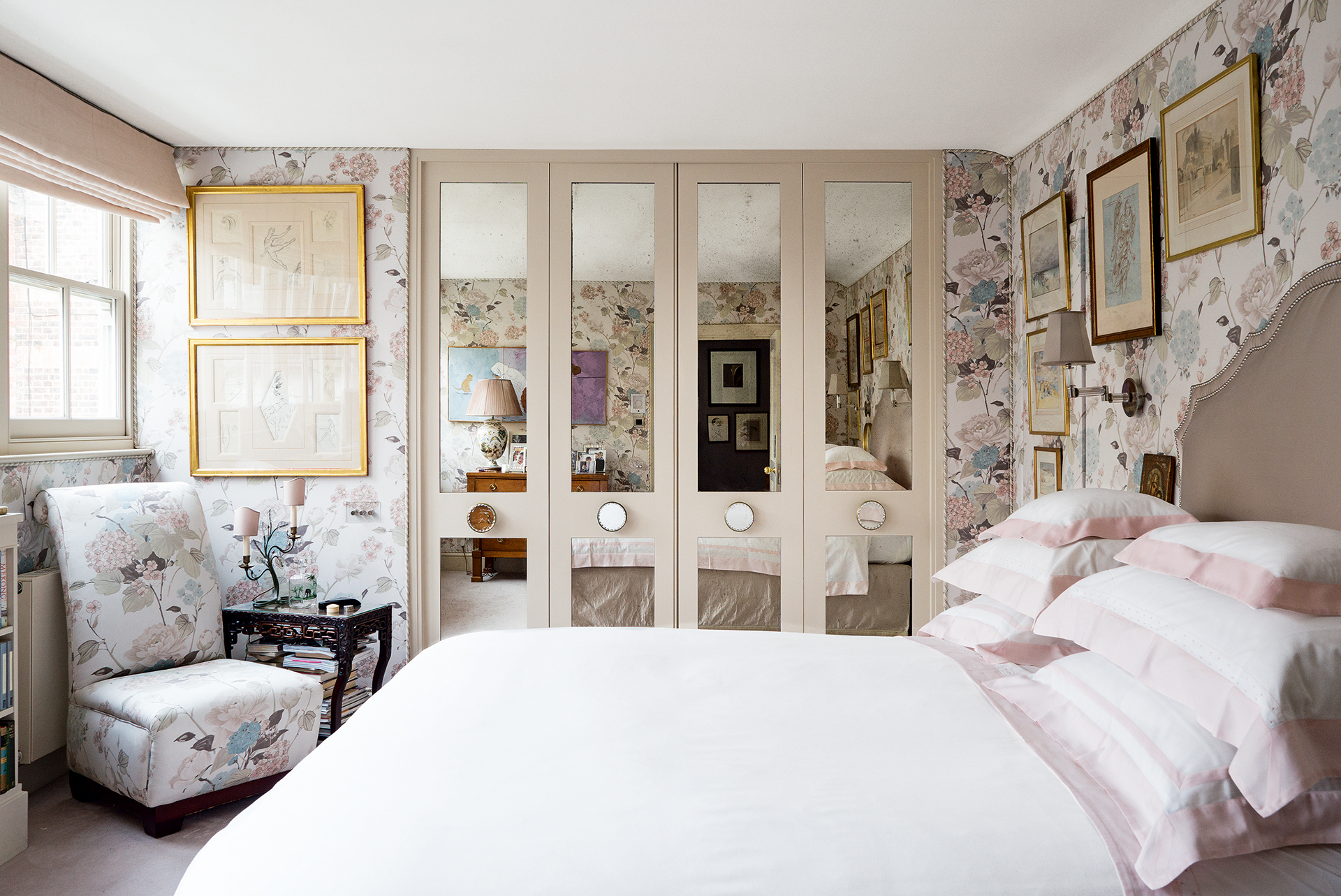
Design expertise in your inbox – from inspiring decorating ideas and beautiful celebrity homes to practical gardening advice and shopping round-ups.
You are now subscribed
Your newsletter sign-up was successful
Want to add more newsletters?

Twice a week
Homes&Gardens
The ultimate interior design resource from the world's leading experts - discover inspiring decorating ideas, color scheming know-how, garden inspiration and shopping expertise.

Once a week
In The Loop from Next In Design
Members of the Next in Design Circle will receive In the Loop, our weekly email filled with trade news, names to know and spotlight moments. Together we’re building a brighter design future.

Twice a week
Cucina
Whether you’re passionate about hosting exquisite dinners, experimenting with culinary trends, or perfecting your kitchen's design with timeless elegance and innovative functionality, this newsletter is here to inspire
When it comes to organizing a bedroom, there’s more at stake than just a neat and tidy space. According to the experts, clutter can trigger stress hormones that affect our sleeping patterns, which in turn affects our overall happiness and wellbeing.
To achieve your bedroom ideas, good organization and excellent storage should be a priority. ‘A well thought out bedroom created with care will help you to sleep well and feel calm and happy every day’, says Dr Lindsay Browning, psychologist, neuroscientist and sleep expert for And So To Bed.
Organizing a bedroom is easier than you might think, and even therapeutic, and after a good clear out, you’re well-placed to organize the space you have.
Organizing a bedroom
The more effective your bedroom storage ideas are, the easier it is to maintain an organized bedroom going forwards. Tackling one category or area at a time makes it far less daunting; start by organizing a closet, then move on to organizing clothes and organizing jewelry, for example.
We’ve spoken to professional experts to get the best tips and advice on decluttering and organizing a bedroom, so you can enjoy an ordered and stylish space.
1. Say goodbye to clutter
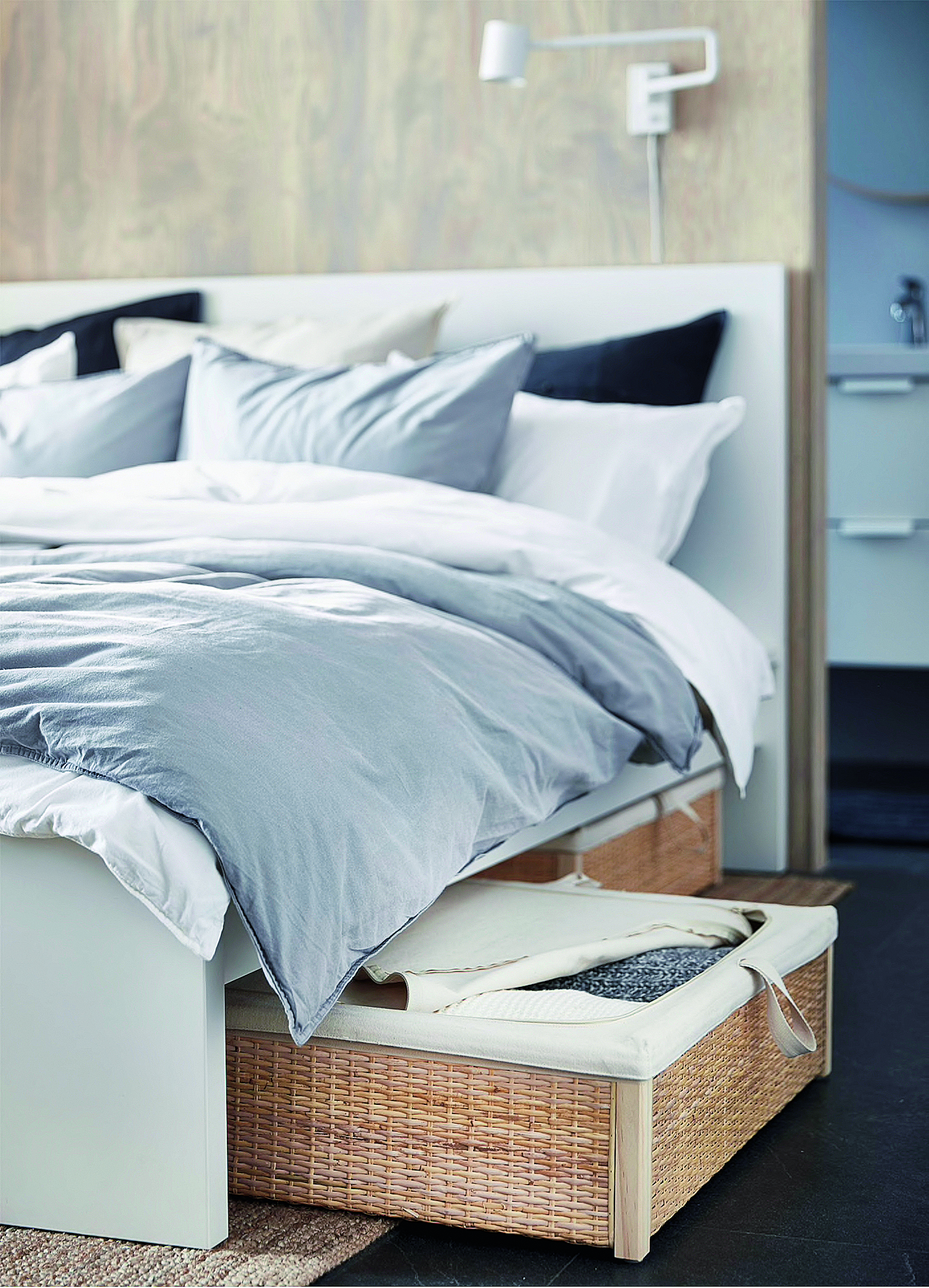
It’s impossible to relax in a space that’s over full, and the less there is in your bedroom, the better, so begin by decluttering. From well-loved clothing to treasured jewelry, a bedroom is often home to a lot of sentimental items that can be tricky to let go of, but it’s worth it in the long run.
‘Don’t overwhelm yourself by pulling the entire contents of your bedroom out in one go – it’ll take far longer than you expect,’ says decluttering expert Vicky Silverthorn of You Need a Vicky. Start small and focus on one area, work on it and complete it – then stop.’
Design expertise in your inbox – from inspiring decorating ideas and beautiful celebrity homes to practical gardening advice and shopping round-ups.
When deciding what to keep, ask yourself three things. Is it functional? Does it look good? Does it do what it needs to do? If the answer is no to any of these, it’s time to let it go.
It’s not just clutter that can have a negative effect on your state of mind. Devices, desks and anything work related should be banished from the room, too – they can create an association of alertness instead of relaxation, not ideal in a room designed to unwind.
2. Go bespoke to maximize storage
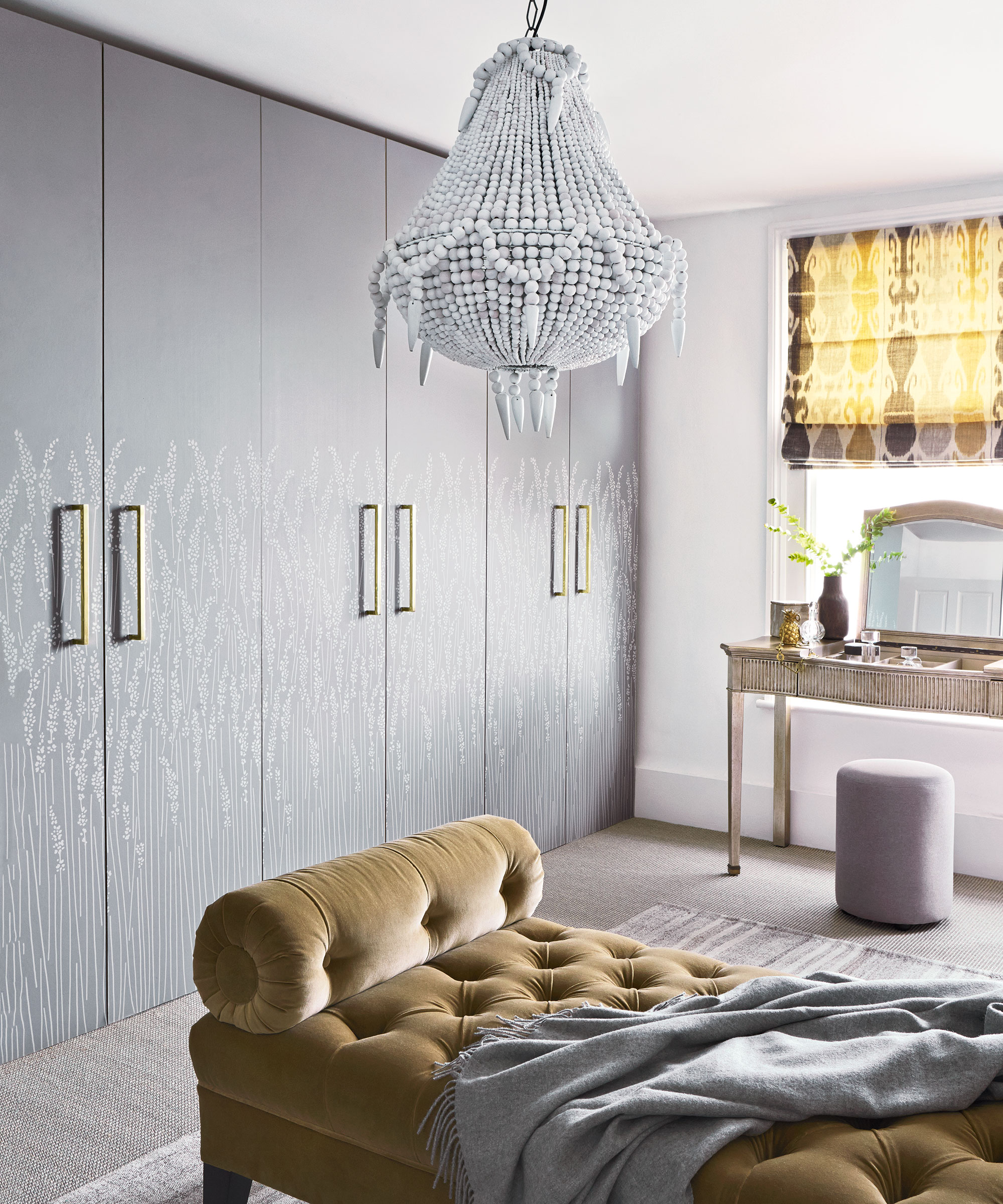
The key to a well-organized bedroom is efficient clothes storage ideas. Bespoke systems help to make the best of the space you’ve got – particularly important if you’re organizing a small bedroom. Sized to the location, they also give flexibility in terms of internal storage solutions.
‘We believe in the beauty of creative functionality, proposing ‘his and her’ drawer fitments that provide innovative compartments, hanging rails, shoe and trouser racks and specialist pull-out shelving to suit your lifestyle’, says Simon Bodsworth, managing director at Daval.
3. Zone your bedroom
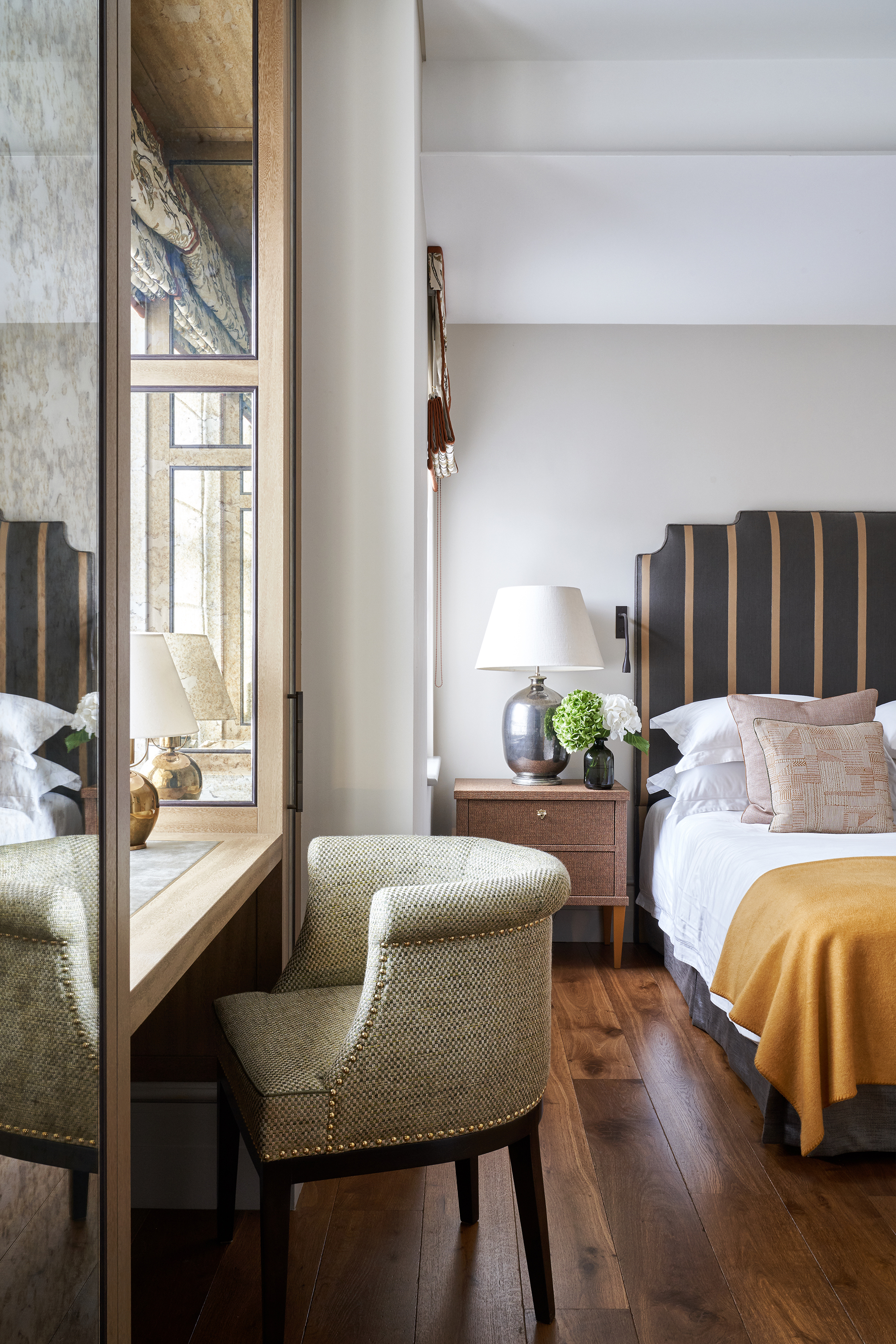
Think about how you use your bedroom and arrange items accordingly.
‘Designating an area for sleeping, dressing, putting makeup on and so on gives structure and creates a nice sense of flow to the room, plus you’ll have a clear idea of what needs to go where. This will help you stay on top of organization going forwards,’ home organizer Emma George of Declutter with Emma.
Juliette Thomas of Juliettes Interiors agrees, and adds: ‘if you’ve got the space, consider zoning your bedroom with a rug and a cozy armchair. Not only does this look stylish, it provides you with a cozy reading space when you fancy some alone time.'
4. Position your bed perfectly
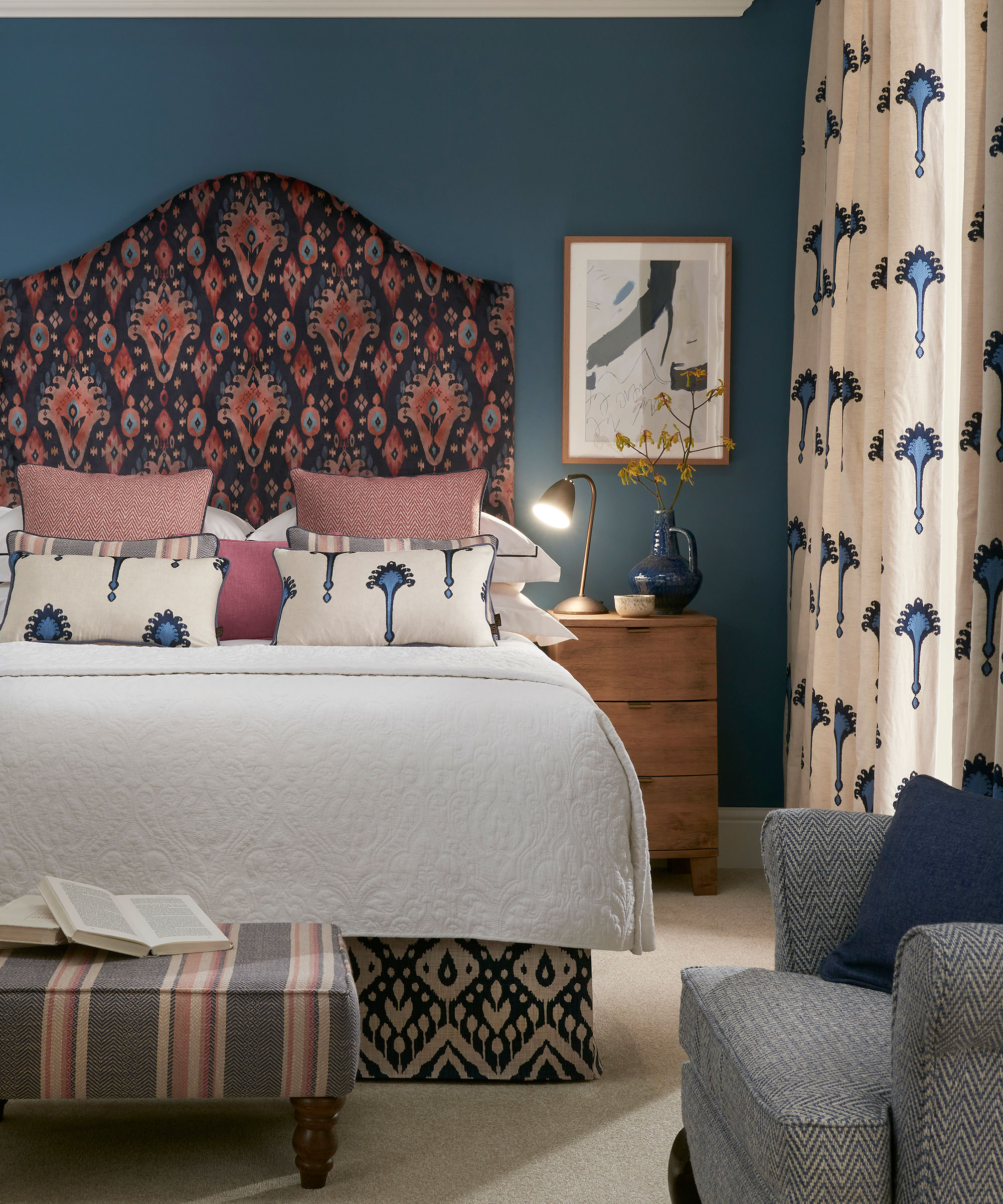
How you position your furniture is thought to affect the flow of energy in the room, with Feng Shui a never-ending trend. According to Martin Gill, Managing Director of And So To Bed, if bedroom layout ideas are planned properly, you can create a calm and restful environment, starting with your bed:
‘Position your bed in a commanding position; ideally you should be facing the door while not directly in line with it. Avoid placing it underneath low beams, soffits or sloped ceilings if possible, and line your headboard against a solid wall with space available on the other three sides.’
5. Create ‘drop zones’ to catch clutter
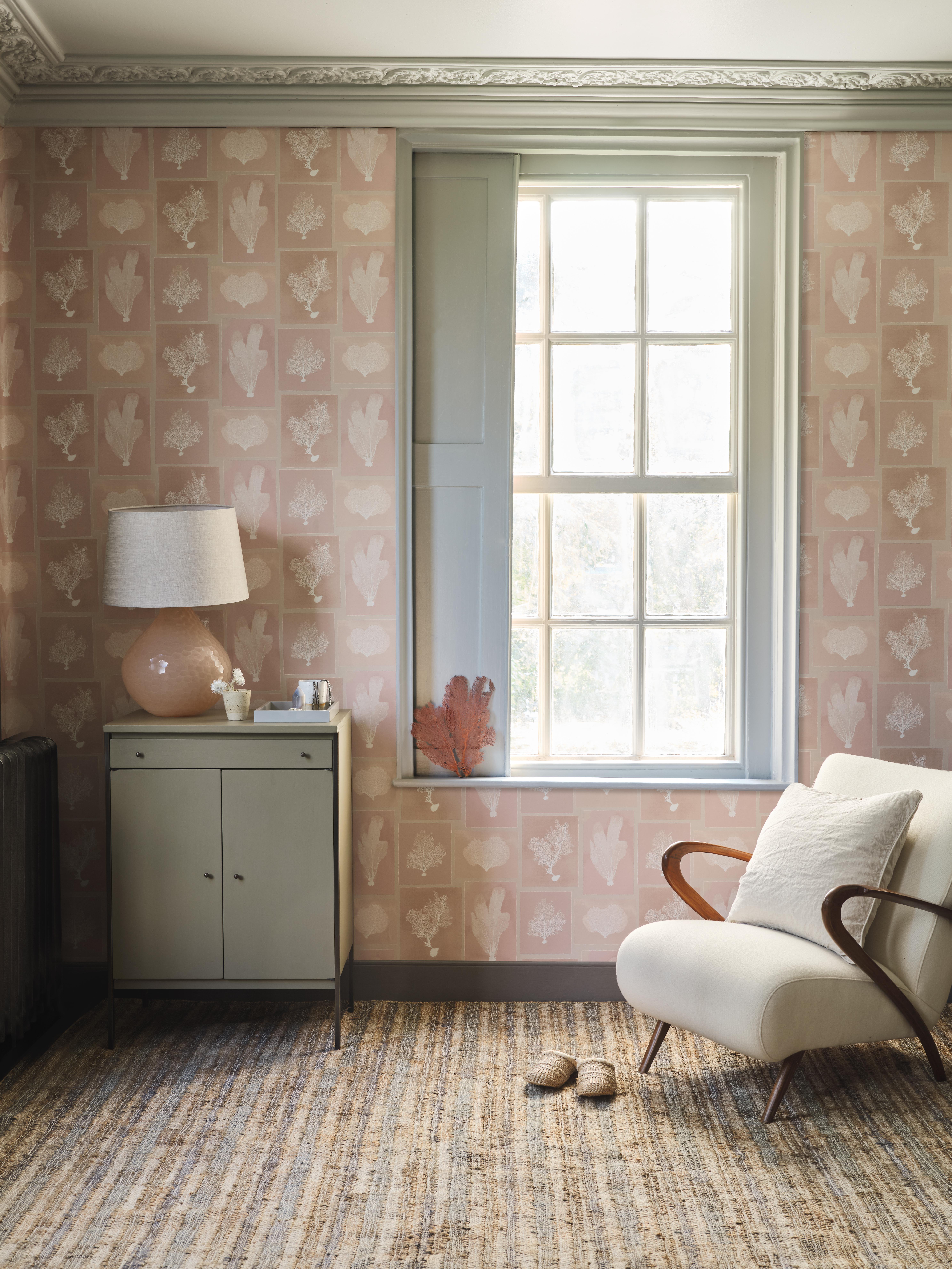
The clue is in the name – a bedroom’s primary purpose is to enable a peaceful night’s sleep. For that reason, any items not related to that purpose should be relocated. Set up storage space (a slim cabinet or chest of drawers or a narrow console table work well) just outside your bedroom door for storing books, devices, yoga mats, and anything else you might want to keep easily accessible for use during the day.
If you’re lucky enough to have an ensuite, consider positioning a console table near the door. This acts as a pre-bath drop zone for clothing and other small items that might otherwise end up on the floor.
6. Use the space under the bed
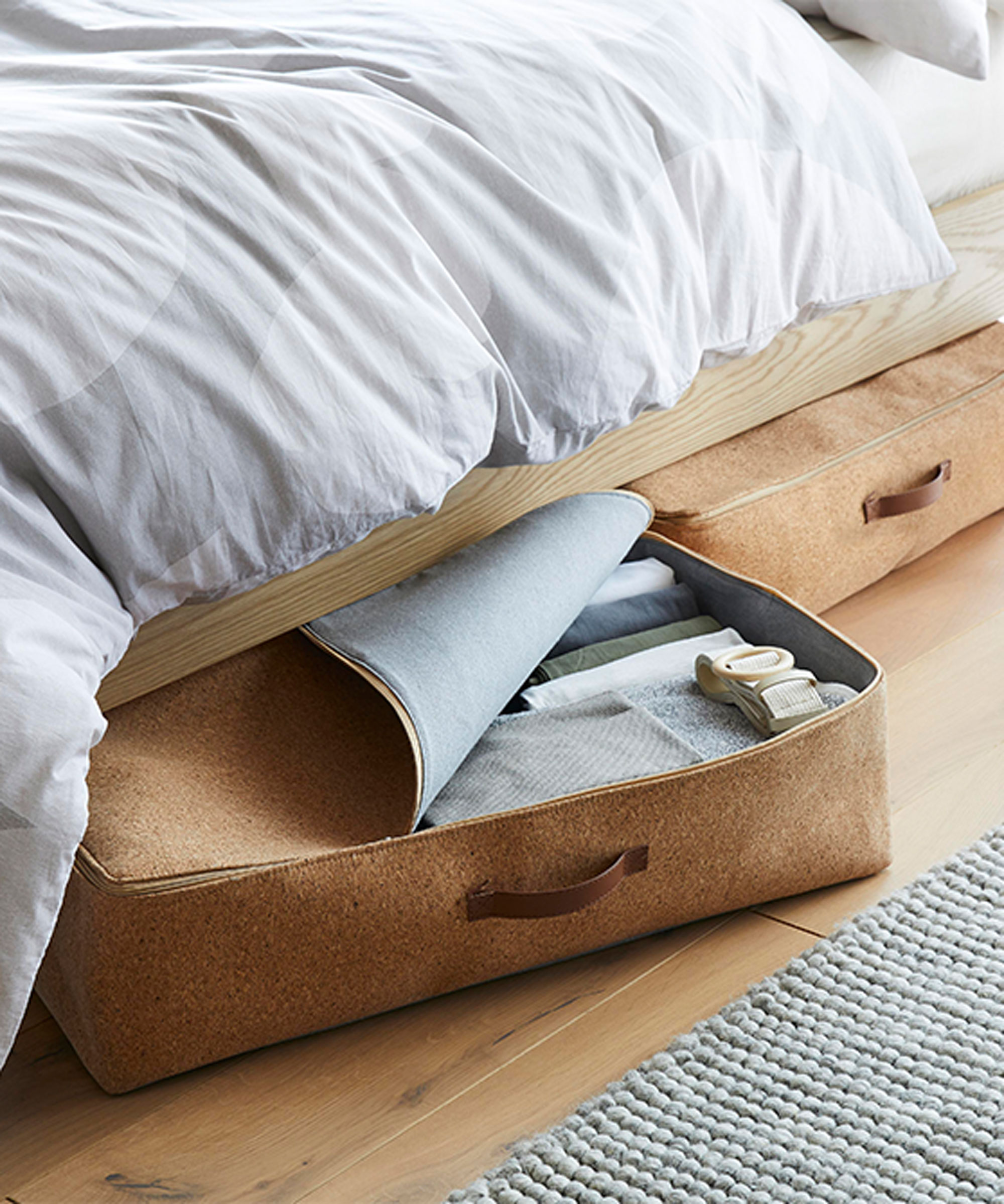
Free up prime storage space elsewhere in the bedroom by storing seasonal clothing, bedding and things you don’t need to access often such as ski jackets or hiking boots in underbed storage ideas. Be conscious that out of sight often means out of mind, so carry out a regular declutter to avoid it becoming a dumping ground.
If you’re in the market for a new bed, consider an ottoman design – they’re the best for maximizing storage space. Alternatively, pull out drawers or boxes are just as useful, just be sure to measure the height and width beforehand; ideally you want a snug fit, so you’re not left with dead space.
7. Neaten up your nightstand
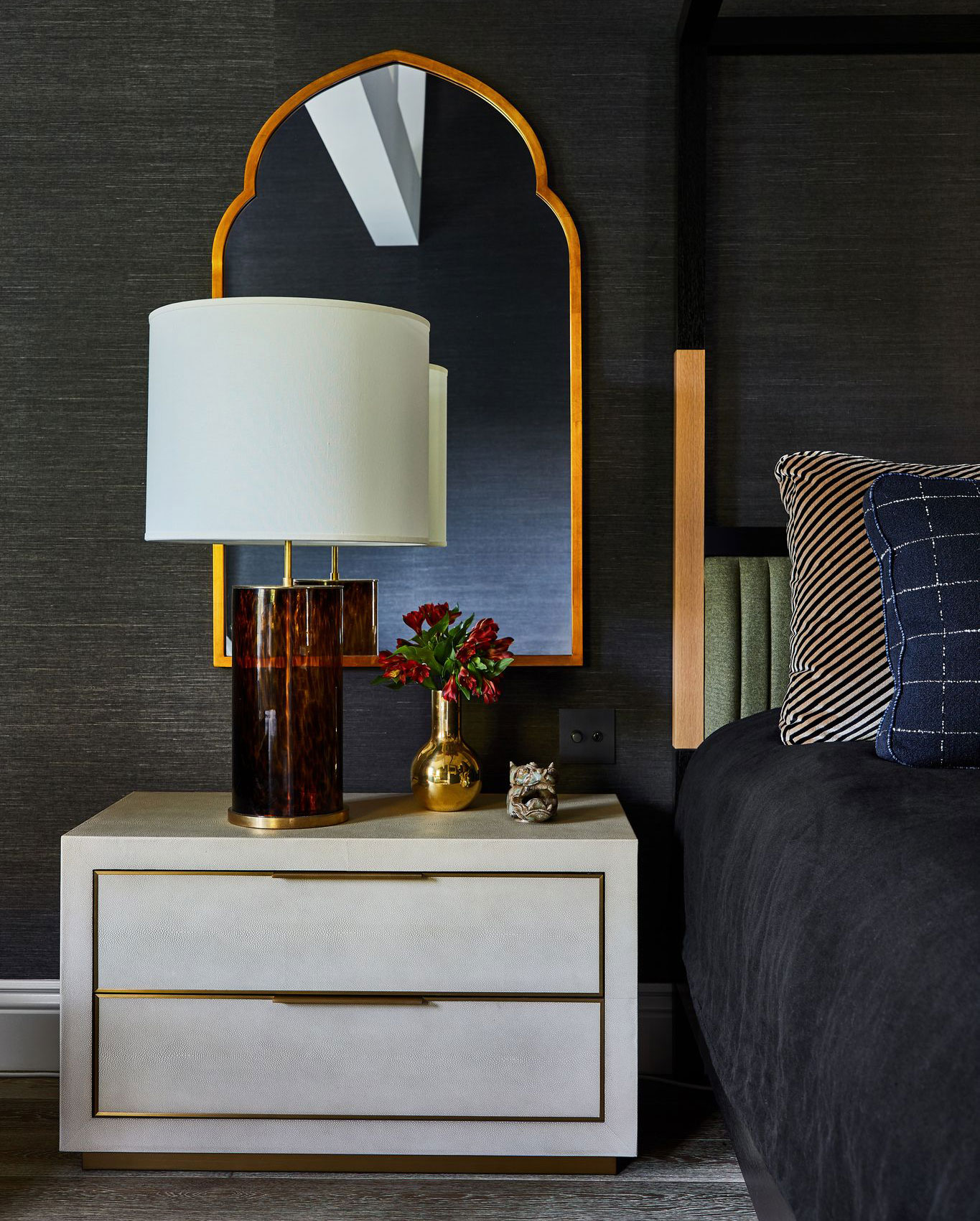
From drinking glasses and books to eye-masks and jewelry, a nightstand can quickly turn into a catch-all – and a cluttered one at that. You’re more likely to lose things, too. Reserve it only for items you need immediately before sleep or upon waking, anything else can be stored elsewhere.
‘We often recommend a design with at least one drawer to stash items out of sight, but we do love the look of an open nightstand as well – just be sure to add in some lidded boxes, baskets and ceramic bowls to corral items and create a sense of organization,’ says Heather Goerzen, design editor and Havenly.
8. Store jewelry in style
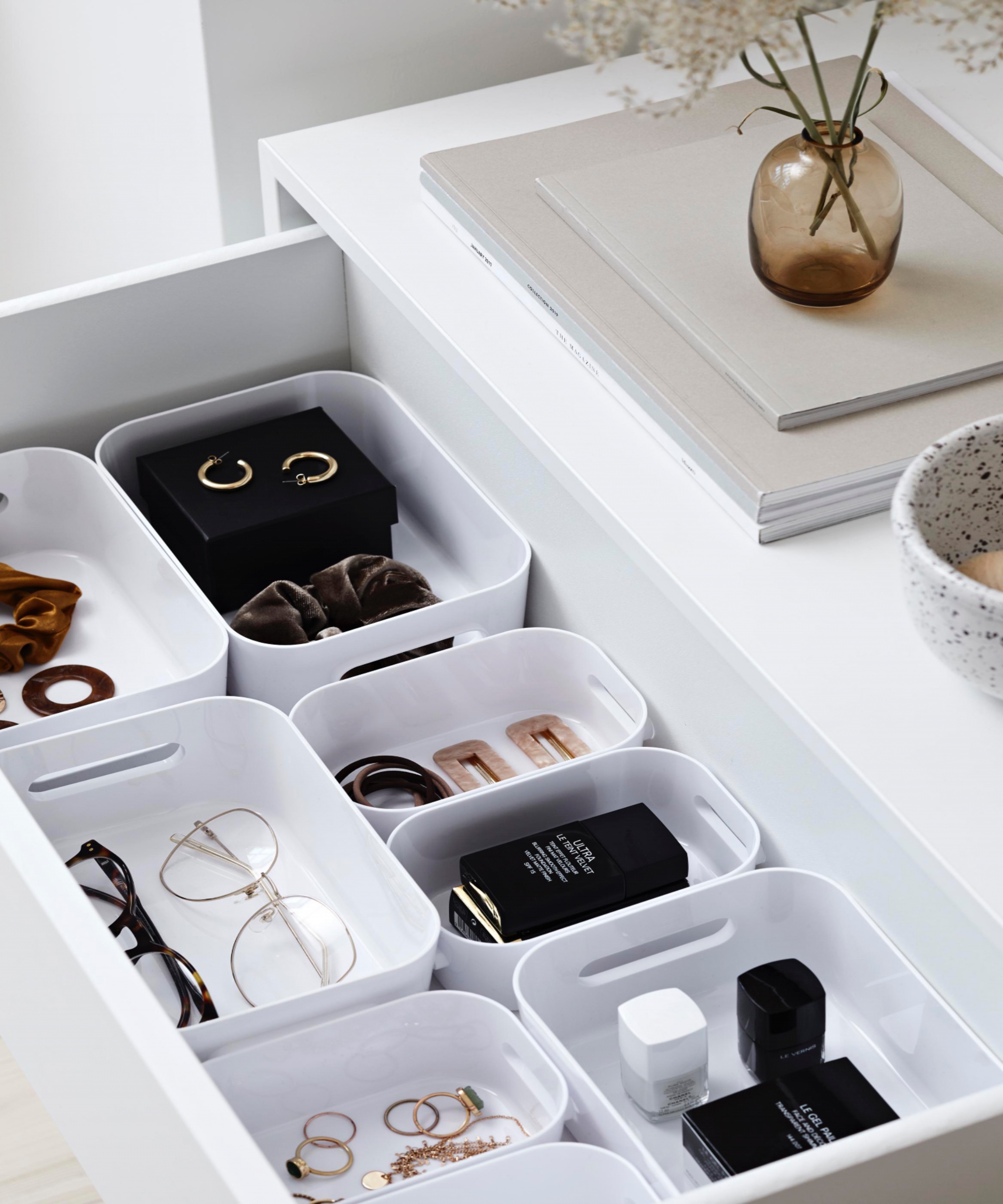
When organizing jewelry, doubling up on necessary jewelry storage solutions and décor is a clever way of bringing a decorative flourish to your bedroom without adding clutter, whether it’s a beautiful jewelry box atop a chest of drawers, a stylised collection of small dishes, boxes and trays or eye-catching necklaces hanging from decorative hooks.
Reserve on-show surface space for pieces you wear everyday and stow lesser-worn pieces away out of sight. Use clear, stackable containers so you can see what you need at a glance.
‘If you’re storing jewelry within drawers, use dividers, compartments or bespoke jewelry organizers to help you keep your pieces separated into categories – this makes it easier to find what you need in a hurry,’ says Emma. The same goes for organizing makeup, where dividers and compartments will keep essentials to hand.
9. Categorize your clothes
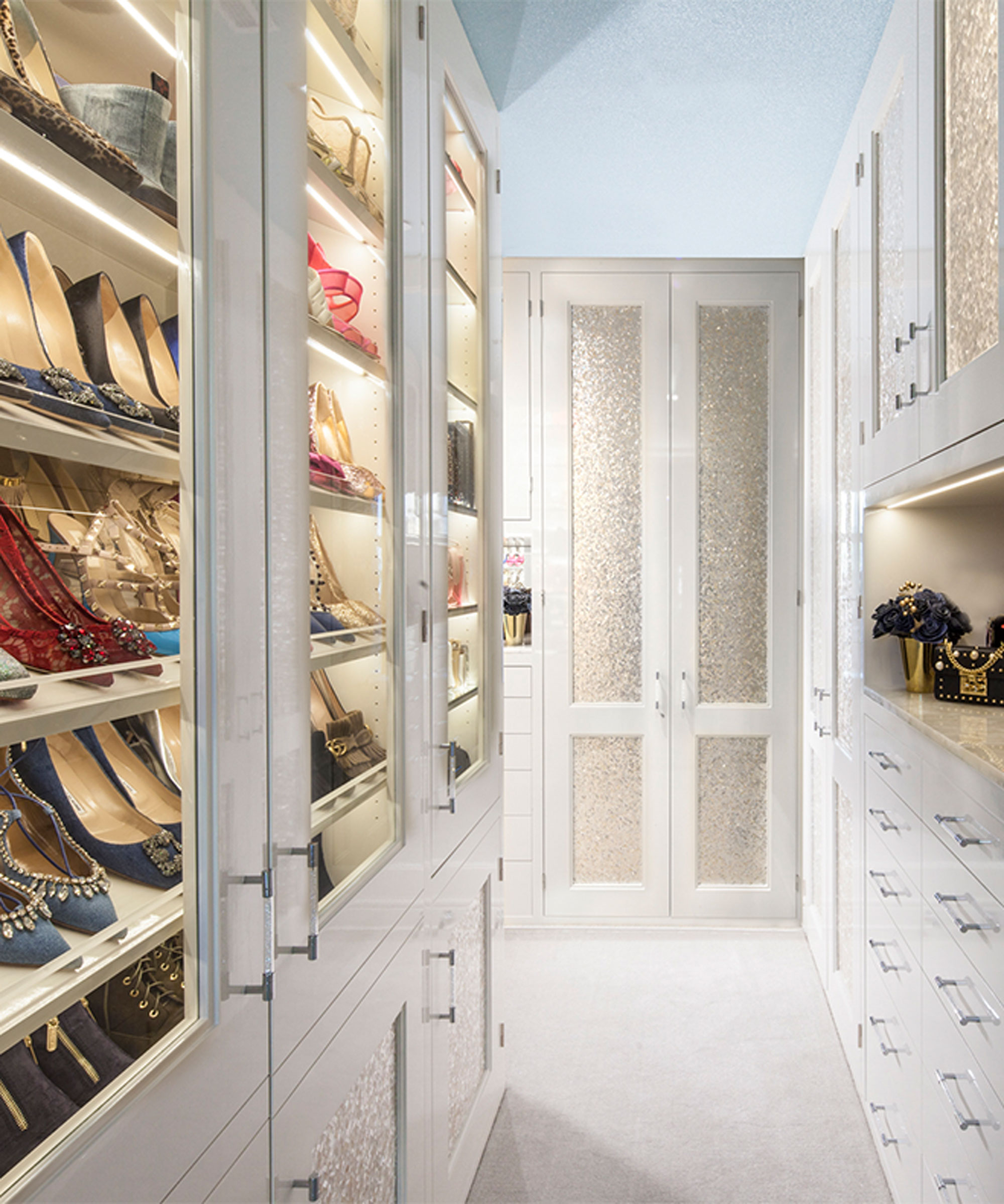
Effective closet organization is integral to an orderly bedroom and can transform your morning routine for the better, so it’s important to give some thought to how you organize clothes and organize shoes.
Start by paring back your collection, then group garments into categories. Create sections for workwear, casual and occasion wear to make the morning routine run as smoothly as possible. Give everyday essentials ‘prime real estate’ and stow away out-of-season items that don’t need to be accessed regularly.
If you’re using open storage, such as a clothes rail or shelving, consider organizing your clothes in order of color to create an attractive ombre effect. This method is widely thought to make you feel happier, according to organizational guru Marie Kondo.
10. Keep the floor clear
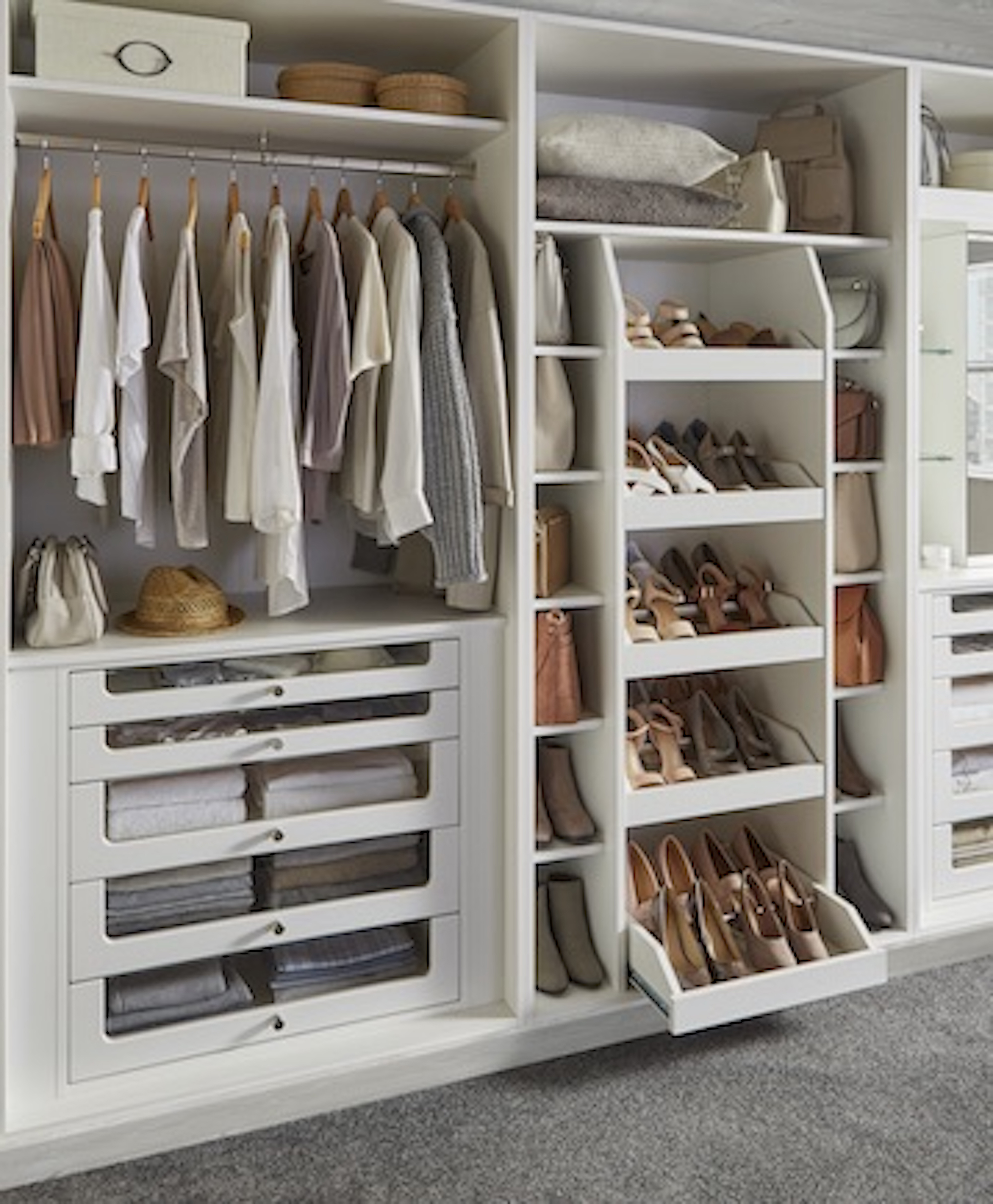
A floor strewn with shoes and clothes is not conducive to a relaxing space. Get into the habit of putting items away at the end of the day. Make sure everything has a home; if you have to question where this is, then it’s not obvious enough. Bedroom organizers, such as well-placed baskets, make it easy to throw things into if you’re feeling lazy – whether it’s shoes or dirty laundry.
‘Our separation basket comes with dual compartments, removable tote bags and easy-carry handles, saving you both time and frustration. Store it in a wardrobe or the corner of the room to free up more space,’ advises Antony Joseph, design director at Joseph Joseph.
What is the easiest way to organize a bedroom?
The easiest way to organize a bedroom is to arrange items into categories, then tackle each one at a time; it’s a strategy that works if you’re organizing a small bedroom as well as a bigger one, or even if you're organizing a nursery. This is also a useful approach if you have a busy lifestyle; you might have an hour right now to organize jewelry, then you can organize your closet when you have more time, for example.
Consider how you use your room and keep your categories together where possible – all jewelry in a drawer, out-of-season items under the bed and so on. If everything has its place, it’s quick and easy to put things back, so you’re more likely to maintain a neat and tidy space.
How do I organize a bedroom with too much stuff?
Minimalism is key to a well-organized bedroom, so the first thing is to have a good clear out. If decluttering is something you’ve not tackled in a while, it may feel daunting, but once you get started, it can feel great. You’re then left only with items you want to keep, which makes the organization process far easier.
Another way to cut down on the amount of stuff you have is to bear in mind that a bedroom’s primary purpose is for sleep, so anything that’s not related to that should be stored outside of the room – especially work-related items and screens.
You may be limited to organizing a small closet, so make sure you’re utilizing every inch of available storage space (think under-the-bed, the back of a closet door, nightstand drawers etc) and doing so in the most efficient way possible: drawer dividers, bedroom organizers, clear containers, hooks and so on.

For 10 years, Tara King worked as a Content Editor in the magazine industry, before leaving to become freelance, covering interior design, wellbeing, craft and homemaking. As well as writing for Ideal Home, Style at Home, Country Homes & Interiors, Tara’s keen eye for styling combined with a passion for creating a happy – and functional – family home has led to a series of organization and cleaning features for H&G.
